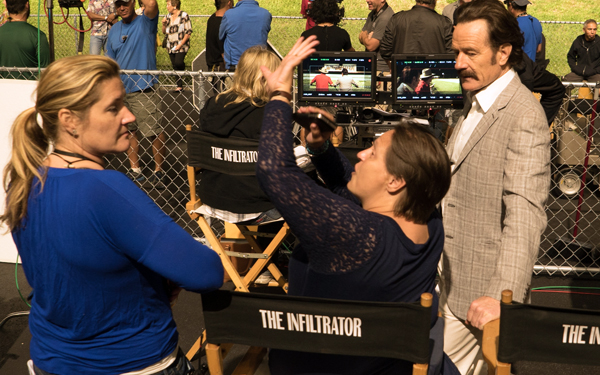The relationship between screenwriter and film producer is fundamental to getting a movie made. And few know this better than producer Miriam Segal, founder and managing director of Good Films.
Segal, whose father was a writer, was always interested in storytelling. Beginning her career as a director for theatre, she transitioned to radio drama before moving onto BBC Films in the UK, where she worked for six years.
“I did limited serials, three or five-parters,” she recalls. “I would always develop the ideas myself. An article or a book I wanted to adapt. I would work with the writer and package it from inception.”
In 1998 Segal left the BBC to start her own production company in 1998. Since then, she has produced 2008’s Good, starring Viggo Mortensen and Jason Isaacs; The Great Ghost Rescue in 2011; and 2016’s The Infiltrator, starring Bryan Cranston.
Her next movie, LAbyrinth, a crime thriller about the murder investigations of Tupac Shakur and Biggie Smalls, which stars Johnny Depp, is due to hit theaters this fall.
Because the intricate relationship between a screenwriter and a producer is so integral to moviemaking, Creative Screenwriting chatted with Segal about this important and sometimes mysterious-seeming process. From detailing what a producer does to how she finds her material, Segal shares all.

Benjamin Bratt as Roberto Alcaino and Bryan Cranston as Robert Mazur in The Infiltrator.
Photo by David Lee – © 2016 Broad Green Pictures
What do you like about producing?
It’s probably the most challenging job you can imagine besides physical labour. You’re touching every part of the story in a visual form. You’re there from the beginning until the end. Like a great book, it lasts forever. Not even a great car lasts as long as a film.
Can you explain to our readers what exactly a producer does? What does your job entail?
 I’ll have an idea I want to explore, or someone will come to me with a piece of material. For example, take the movie we are working on, LAbyrinth. The book had been going around for 10 or 15 years, about the record of events that happened in L.A. in the 1990s. But there had been some nervousness about making it into a film in the U.S.
I’ll have an idea I want to explore, or someone will come to me with a piece of material. For example, take the movie we are working on, LAbyrinth. The book had been going around for 10 or 15 years, about the record of events that happened in L.A. in the 1990s. But there had been some nervousness about making it into a film in the U.S.
An agent brought it to my attention because they thought a European sensibility would help make it get made – which is exactly what happened. I read the book, and took the material to a young American screenwriter, Christian Contreras, who was very new, and who I had worked with previously.
He had the ear for the right tone, and was the right age group for the book. We started working on it through a number of different drafts. After we got to a point where I thought it was ready, I took it to the agent who had given me the book. I said to him that he should take a look at it, and also the writer – because he had no representation.
Then the script got out without me knowing, and it went onto the Black List, and Christian became lauded by the community. People were then aware of the script. We linked up with the director Brad Furman who we had worked with on Infiltrator. We then went to Johnny Depp’s people and he came on board relatively quickly,
We knew we had a tight window to make the film. So we went to the Toronto Film Festival to meet with distributors, and the film sold fairly quickly. We made the film within a four-month period — which is very unheard of for a film this size — and we just wrapped shooting. It should be distributed for the fall.
So that will be a year from selling to distributing, which is rare. But it had a lot of momentum, plus it’s fairly relevant material.

Miriam Segal on set of LAByrinth
As a producer, what are you looking for in terms of stories? What scripts typically grab you?
I’ve never made a film from a spec script. I’ve always developed it from someone’s idea, or a book or another source material. That’s not to say I won’t ever do so, but spec scripts tend to go around to the studios, so by the time it gets to me, it probably won’t be that great. Though there are exceptions to the rule.
I tend to look for two things. First, that it’s inspiring or informative. You can actually connect to it and will have people look at their lives. But that it’s also commercial. I don’t tend to do art films. I don’t also do genre films. I can’t imagine making a horror movie or sci-fi or comedy.
I wouldn’t make a comedy just because it’s a comedy. Though if it happens to be about Trump’s presidency and it’s a satire, then I would do it because it connects to things that I want to be involved in.
It’s so hard getting a film made, and you need to work on a film that it is worth it. You have to be proud of it.
How do you usually find your stories?
A multitude of sources. Articles, books.
I’ve always been interested in child soldiers, and I’ve always been interested in how we police our societies, and law and order. So that’s sort of what LAbyrinth is about.
And Infiltrator is about the relationship between politics and corruption, and money connected to drugs. The movie is a drama and thriller, but also how about the antagonists use methodology to tell their story.
I’ve recently commissioned an original story, which is the first time I’ve completely developed an original story in terms of a feature film, and that one’s about women and identity and reinventing your history.
My films are very diverse, which makes it interesting. I wouldn’t be able to do it if it were just sci-fi or comedy. If I worked for Marvel, I would go completely crazy.

The Great Ghost Rescue
Once you move forward with a script, how much is the writer involved in the process, from development to the actual production?
It depends on the director. For example, Brad Furman [The Infiltrator, LAbyrinth] wants the writers on set. He wants them involved. With other directors, once the writer’s job is done, they take on the role of the writer – and in a sense they make their own adjustments and rewrites.
From your experience, what do you think is important for writers to know about the production process?
It’s important to remember that every company will be different, especially studios. But what I find interesting is how little writers watch movies. They often read scripts that they’ve bought in a store or online and study them, but the crazy thing is, often those have very little resemblance to the original screenplay. Those are the scripts that went through production.
I think what writers need to do is find and retain their original voice. So many scripts today are prescriptive or are trying to guess what a studio is looking for, and some of the best scripts are entirely written from a novel or a story that needs to be told, or a character that someone loves. I think that’s what sad because writers are not the stars as they once used to be, and that needs to come back because people are getting bored with what’s happening now.
But writers need to find their voice and their medium. Know why they want to write for film and not any other medium. Not theatre, not TV or a novel. Why your story should be told as a movie.
And then write from the heart. Write what you want to write. What drives me crazy about the US is that writers need to pitch their stories. That should be my job. The writers write and the producers sell. If the writers are trying to sell it on the page, then they will never let their imaginations fly, which is unfortunate.

Bryan Cranston as Robert Mazur in The Infiltrator.
Photo by David Lee – © 2016 Broad Green Pictures
So how would a writer become acquainted with a producer?
Unfortunately, largely through the agencies. Particularly here, it’s just a crowded industry.
It’s sad, because one of my first jobs was to run a writer’s division at the BBC. Every single thing had to be read. You’d get some crazy things, but there were also some things that were made, and writers were found through that open door policy.
It’s tricky when you are working for a commercial industry like Hollywood, and so many people want their voices heard. We don’t read unsolicited material. We don’t have that much time to do it with a company this small. That’s why we rely on the agencies. There are certain agents I trust, and if they suggest to me a writer or a book, I’ll read it.
You said writers should avoid being prescriptive, and write what they want to write. Do you have any other advice for screenwriters?
An English writer I knew came over here to L.A. and worked at a big studio. He met with some very famous people, and they told him that if he wanted to write movies, he should never leave his room and write ten screenplays about ten things he really wanted to write about. “Just sit down and just write. And when you’ve written the eleventh script, that’s the one you send out.”
And he did exactly that. The eleventh script ended up getting made, and three of his other ten screenplays were also read over time. So he taught himself how to write a screenplay.
It’s an interesting story and a purposeful one, but I personally think you need to live a life. How can you have anything to write about without living a full life? How can you write about things if you haven’t experienced them?
I think that’s part of the problem. A lot of people watch a lot of TV and watch a lot of movies, but they aren’t actually living, or reading books and reading newspapers. It’s a shame there’s so many people who don’t read newspapers any more, or know what’s going on. There are so many amazing stories happening every day somewhere in the world.
Featured image: Miriam Segal with Bryan Cranston on set of The Infiltrator
[addtoany]

